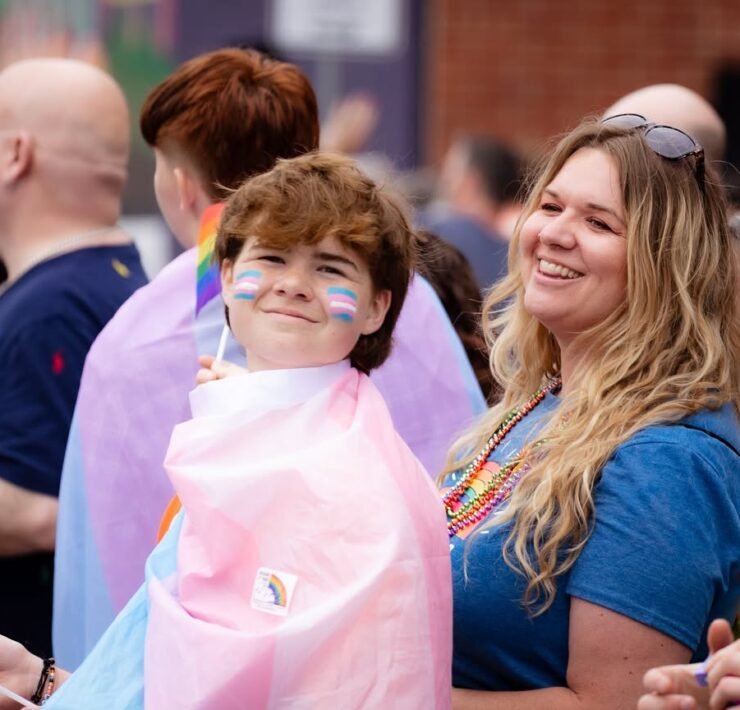Embracing the Spectrum of Feeling, Existence, and Mental Health

Keegan (they/them) is a journalist/artist based in Los Angeles.
More than a year after COVID-19 first took its grasp on our world, people are collectively talking about mental health more than ever before. Every person had to adapt long-term skills around coping with the ongoing grief and increased mental energy that comes with navigating a global pandemic.
The past 15 months is, personally, a mixed bag of reflection and often my view of the highs and lows of the tumultuous (and ongoing) period reflects my experience with dealing with my own mental health and existing as a person in the world, as a whole.
In regard to my own mental health and coping, I often reference the spectrum of emotions and events that come with being alive. We are not entitled to and simply will not experience a life filled solely with what we call ‘good’ feelings because our existence, historically, inevitably comes with it’s share of ‘bad,’ if not absolutely horrible and gut-wrenching, feelings and happenings.
Whatever iteration of, “It’s always darkest before the dawn,” or, “The bad moments are there to recognize the good ones” applies here. Our time on this planet innately is about experiencing the vast spectrum of emotions and moments.
I think about how, even through some of the worst moments of my life and the pandemic, I can usually point to the good or the positive that came out of it. Often it’s not possible to see or name this in the moment, though sometimes that duality exists innately in the same breath as I speak on a challenging, character-enriching moment in my life.
I was part of an overworked skeleton crew through most of 2020, but it gave me extra grit, and it ultimately helped me to realize that working in the tech industry was not going to be a permanent choice for my future. While I was going through my own pandemic struggles and always recognized the validity of my own challenges, I found gratitude in what I still had: my job, my sobriety, my health, my family members.
The most monumental decision in my adult life, addressing my alcoholism and getting sober in 2018, was one of the hardest, the most confrontational, and the most isolating experiences I’ve had, but comes with all of the gratitude and foundations that serve me innately every day of my life. Those shameful experiences explored in depth while facing my alcoholism are also benchmarks for progress as I navigate my new, booze-free life.
This is not to say that moments of hardship aren’t just that: hard. What I do have now that I haven’t always is that framing, those tools so to speak, to manage them.
A lot of my mental health management revolves around mantras I first learned in AA which can benefit everyone, not just alcoholics and addicts.
One is not doubling down on negative emotions, a recurring tendency of mine in active addiction. Say, I’m feeling angry. I never want to be a participant in toxic positivity for myself or others, preaching that me or another person needs to favor and push for a positive emotion, “Just be positive,” over actually dealing with and working through the negative.
I try to give myself the space to feel the way I’m feeling, but keep myself from doubling down, feeling ‘angry about being angry,’ or ‘sad about being sad.’ When I’m feeling ready to move on, even if it’s just going from angry to slightly peeved, I also give myself the grace to do so, when that feeling is no longer serving me.
The other is the serenity prayer. This was a staple of early sobriety and reforming my coping skills, and it’s something I think about consciously and unconsciously on a daily basis. As an atheist (and recovering Catholic), I always negate the, “God,” intro salutation, but it goes, “Grant me the serenity to accept the things I cannot change, the courage to change the things I can, and the wisdom to know the difference.”
In essence, what’s the problem? OK, can you do something about it? OK, then do it. Can’t do anything about it? OK, then move on; there’s nothing you can do.
It’s played a crucial role in deciding how and where to apply my energy, which became even more important as I, and so many others, found themselves exerting so much extra, day to day, during COVID. Being able to evaluate what I could actually do for certain situations versus what was truly out of my control was a crucial filter for coping during the pandemic.
I’ve heard a lot of chatter in the past year, especially from Gen Zs and Millennials, referencing how hard a time it is to be alive right now, and yes, it is. I never want to invalidate that truth, though I also am quick to point to human history as a whole as being a “hard time to be alive.” Part of the human experience is suffering, and it’s been that way to varying degrees regardless of the time period. In 2021, we just have computers in our pockets to follow the suffering worldwide, in real time, and that’s truly never been that case until recently. It takes a toll, surely, but we can’t pretend the scope of human history hasn’t been an all around challenging, fluctuating experience.
We are forced to reckon with our lives as simultaneously challenging, rewarding, gut-wrenching, and beautiful experiences. While it doesn’t make the hardships less hard, approaching those daunting inevitabilities with openness and having a tool belt for when they come up has ultimately helped me move forward and embrace the abundant joy and warmth that is the human experience.
What's Your Reaction?
Keegan (they/them) is a journalist/artist based in Los Angeles.










